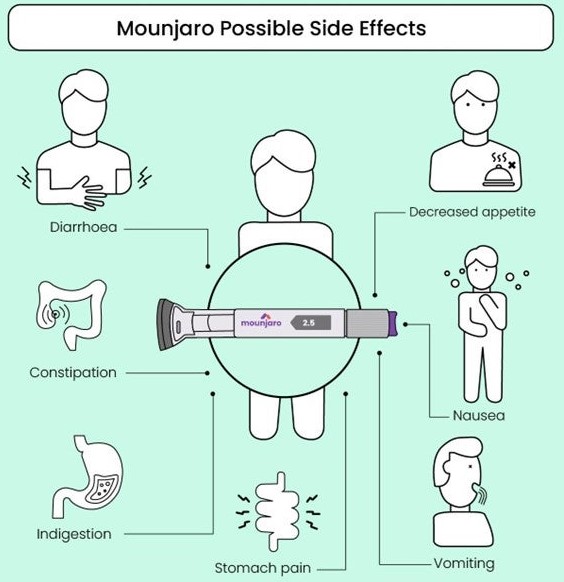BOURSESSENEGAL – If you’re considering Mounjaro, a medication recently approved for managing type 2 diabetes, it’s essential to understand its potential side effects. Like any medication, Mounjaro may bring about certain reactions that could affect your health and well-being. In this article, we’ll discuss what Mounjaro is, explore its benefits, and highlight the most common side effects associated with its use. By the end, you’ll have a clearer understanding of what to expect and how to manage any adverse reactions.
What Is Mounjaro?
Mounjaro (tirzepatide) is a groundbreaking medication designed to help individuals with type 2 diabetes achieve better blood sugar control. It works by mimicking the action of certain hormones in the body, which helps regulate insulin secretion and glucose levels. This dual-action mechanism not only aids in managing diabetes but also has shown potential for weight loss, making it a popular choice for many patients.
Benefits of Mounjaro
Before diving into Mounjaro side effects, it’s crucial to recognize its benefits. Mounjaro can help:
- Lower blood sugar levels effectively.
- Reduce the risk of cardiovascular complications.
- Promote weight loss, contributing to overall health improvement.
These benefits can significantly enhance the quality of life for those managing diabetes. However, understanding the possible side effects is equally important.
Common Mounjaro Side Effects
Like any medication, Mounjaro comes with its share of potential side effects. Here, we’ll explore the most commonly reported issues, helping you to prepare and identify any reactions you might experience.
Gastrointestinal Issues
One of the most frequently reported side effects of Mounjaro involves gastrointestinal discomfort. This includes:
- Nausea: Many users experience feelings of nausea, especially during the initial weeks of treatment.
- Diarrhea: Some may encounter diarrhea, which can lead to dehydration if not managed properly.
- Vomiting: Though less common, vomiting may occur as the body adjusts to the medication.
These symptoms often subside as your body becomes accustomed to Mounjaro. However, if they persist, it’s vital to consult your healthcare provider.
Injection Site Reactions
Mounjaro is administered via injection, and some individuals may notice reactions at the injection site. These can include:
- Redness or swelling: Mild redness or swelling at the injection site is common.
- Pain or discomfort: Some may experience brief pain during or after the injection.
These reactions typically resolve on their own within a few days. If you notice severe swelling or pain, seek medical advice.
Risk of Hypoglycemia
While Mounjaro can help control blood sugar levels, there is a risk of hypoglycemia (low blood sugar), especially when combined with other diabetes medications. Symptoms of hypoglycemia include:
- Shakiness
- Confusion
- Sweating
- Dizziness
It’s crucial to monitor your blood sugar levels regularly and to be aware of these symptoms. If you experience them, consume a quick source of sugar and notify your doctor.
Rare but Serious Side Effects
Although most people tolerate Mounjaro well, some serious side effects warrant immediate medical attention. Be vigilant for the following:
Pancreatitis
There have been rare cases of pancreatitis reported among Mounjaro users. Symptoms include:
- Severe abdominal pain
- Nausea
- Vomiting
- Fever
If you experience any of these symptoms, seek medical help promptly.
Thyroid Tumors
Animal studies have indicated a potential risk of thyroid tumors associated with Mounjaro. While this risk has not been confirmed in humans, report any unusual symptoms such as:
- A lump in the neck
- Difficulty swallowing
- Hoarseness
Discuss these concerns with your doctor for personalized advice.
Kidney Issues
Some patients have reported changes in kidney function while using Mounjaro. Symptoms may include:
- Decreased urine output
- Swelling in the legs or ankles
- Fatigue
If you notice any of these symptoms, consult your healthcare provider for further evaluation.
Managing Mounjaro Side Effects
Understanding potential side effects empowers you to manage them effectively. Here are some practical tips:
Start with a Low Dose
If you’re new to Mounjaro, starting with a lower dose can help your body adjust gradually. This approach may minimize gastrointestinal discomfort and other side effects.
Stay Hydrated
Drinking plenty of water can help mitigate some gastrointestinal side effects, such as nausea and diarrhea. Aim for at least eight glasses of water daily, or more if you experience diarrhea.
Monitor Your Blood Sugar
Keep a close eye on your blood sugar levels to avoid hypoglycemia. Consider keeping a log of your readings to share with your healthcare provider during follow-up appointments.
Communicate with Your Healthcare Provider
Regular communication with your doctor is essential. If you experience persistent or severe side effects, don’t hesitate to reach out. Your doctor may adjust your dose or recommend alternative treatments.
When to Seek Medical Attention
It’s vital to recognize when to seek medical help. If you experience any of the following, contact your healthcare provider immediately:
- Severe abdominal pain
- Signs of an allergic reaction (such as rash, itching, or difficulty breathing)
- Unexplained changes in mood or behavior
Being proactive about your health ensures that you receive the care you need promptly.
Conclusion
Mounjaro offers significant benefits for managing type 2 diabetes, but understanding its side effects is crucial. From common gastrointestinal issues to rare but serious complications, being informed empowers you to navigate your treatment journey. Always communicate openly with your healthcare provider about your experiences, and don’t hesitate to seek help when needed.
By staying proactive and educated, you can make the most of Mounjaro while minimizing potential side effects. Your health journey is important, and knowledge is a powerful tool in achieving your goals.
REFERENCE : https://en.wikipedia.org/



